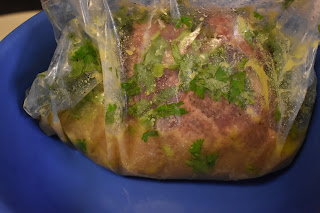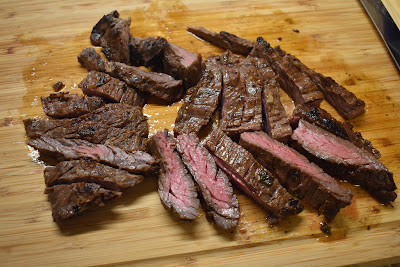Brightening up a steak with bold flavors in an easy marinade!
We have been suffering through a really unbearable heatwave, just like the rest of the world, and it's made getting excited to go outside even for just a few minutes pretty much impossible. Fortunately, Jess and I decided to try our hand at doing some indoor grilling that had some really fabulous results, which we're excited to share with all of you!
Carne asada translates literally to "grilled meat," and its a hugely popular staple in northern Mexico, as well as other parts of the country. Read on to see how you can make some yourself, even if you don't have an outdoor grill!
Carne asada translates literally to "grilled meat," and its a hugely popular staple in northern Mexico, as well as other parts of the country. Read on to see how you can make some yourself, even if you don't have an outdoor grill!
Josefina's family didn't raise cattle, meaning beef products probably weren't something that made frequent appearances on their table the way goat cheese and eggs would have. Still, they could trade or purchase beef from their neighbors or other ranchers who raised cattle, and may have looked forward to grilled beef as part of bigger festivities, just like people do today. Carne asada is an extremely popular dish to serve at parties and family gatherings, probably because it's actually pretty easy to make and can be extremely flavorful if you choose to marinate it. It's so popular that such events are often referred to as a "carne asada" in Mexico, which is more than burgers and hot dogs can say about cookouts in the United States. A day where this flavorful, delicious steak was on the menu would be looked forward to by Josefina and her sisters the same way we get excited about a special holiday roast or that soup Mom only makes a few times a year when company's coming over.
To make our carne asada, first we had to prepare a marinade. I had never actually made one before, to the best of my memory, so it was fun getting a chance to throw all the ingredients into a bag myself instead of sitting at the kitchen island chatting away as my mom made dinner. Ours used the juice from two limes, 1/2 cup of orange juice, 4 cloves of crushed garlic, 1/4 cup of olive oil, 1 cup of cilantro, 2 tablespoons of white vinegar, salt, pepper, and one minced jalapeno. This time, we cut out the ribs and seeds, but Jess thinks we should leave them in next time to see if the end result is noticeably more spicy.
Once everything was mixed together in the plastic bag, we added our skirt steak. Carne asada can be made with many different cuts of meat, but we went with skirt steak because it's cheaper and we're on a budget. Skirt steak can be tough if you don't prepare it properly, and even if you do, it's still not really melt in your mouth tender like other cuts of meat can be. If that bothers you, definitely spring for something like sirloin or tenderloin, but the acid in the marinade does help a little with the tenderness.
After massaging the bag to make sure the marinade is all over the steak, stick it in the fridge for at least two hours or overnight. When given that option in any recipe, I almost always opt for overnight. It helps Jello set, dough to chill, and flavors to get really infused in meat, so if you're not in a time crunch, go for it.
Traditionally, carne asada should be cooked over an open flame, outside. Now, technically we do have access to outdoor grills at our apartment, but you have to sign up to rent them in advance and brave the extreme heat to get down there, not to mention transport your food and then bring it back up again if you don't want to eat it in 110 degree weather, which we certainly do not! The downsides of apartment life, am I right?
To get around this, you can use a cast iron grill pan to (theoretically) get those awesome grill marks on your steak, or just use any skillet you'd usually cook a steak in. The end result will be pretty similar flavor wise, especially if you can get an actual char mark on your meat.
We cooked the steak for about 4 to 5 minutes on each side and did our best to get some grill marks, with mixed results. It smelled amazing though, and even with the vent on, the apartment still smells like nicely cooked steak a day or two later, which was a fun surprise to come home to the day after we did it. Too bad we'd already eaten all the leftovers!
After letting the steak rest, slice it against the grain to try and keep it as tender as possible, and you're ready to serve!
We had ours with some cilantro lime rice (to get rid of the rest of the cilantro) and raw bell peppers, as we were really looking for something light and fresh to make us feel less worn down by the heat and a really heavy dessert I'll be featuring a few days from now, which was really not a smart thing to make for breakfast when you were braving the heat to go to the movies only an hour or so later.
Not a bad plate, if you ask me!
This marinade was really tasty, and definitely something I'd like to make again. It wasn't hot even with the jalapeno, meaning if you're not a fan of spicy food, this could still definitely be for you. If you are, the heat level could definitely use some adjusting, so feel free to experiment. Flavor wise, it was very pleasantly citrusy and salty, with some nice cilantro flavor. It was nice too because even though it's a modern recipe, none of the ingredients would have been completely off limits to Josefina's family, meaning again that they could have enjoyed a variation of this dish themselves.
Carne asada can be enjoyed on its own like we did, or easily worked into fajitas, burritos, tacos, salads, and other delicious dishes. For Americans, that's probably how we're most familiar with this steak, as restaurants authentic and inauthentic alike will call their steak options carne asada to evoke that classic grilled treat.
While Josefina probably didn't enjoy a dish exactly identical to this, some of the ingredients and the preparation were certainly similar to meals she would have enjoyed with her family. Either way, it's always fun to use her and her stories as a jumping off point to explore more Mexican, New Mexican, and Tex-Mex style recipes that have found fans all over the world!
To make our carne asada, first we had to prepare a marinade. I had never actually made one before, to the best of my memory, so it was fun getting a chance to throw all the ingredients into a bag myself instead of sitting at the kitchen island chatting away as my mom made dinner. Ours used the juice from two limes, 1/2 cup of orange juice, 4 cloves of crushed garlic, 1/4 cup of olive oil, 1 cup of cilantro, 2 tablespoons of white vinegar, salt, pepper, and one minced jalapeno. This time, we cut out the ribs and seeds, but Jess thinks we should leave them in next time to see if the end result is noticeably more spicy.
Once everything was mixed together in the plastic bag, we added our skirt steak. Carne asada can be made with many different cuts of meat, but we went with skirt steak because it's cheaper and we're on a budget. Skirt steak can be tough if you don't prepare it properly, and even if you do, it's still not really melt in your mouth tender like other cuts of meat can be. If that bothers you, definitely spring for something like sirloin or tenderloin, but the acid in the marinade does help a little with the tenderness.
After massaging the bag to make sure the marinade is all over the steak, stick it in the fridge for at least two hours or overnight. When given that option in any recipe, I almost always opt for overnight. It helps Jello set, dough to chill, and flavors to get really infused in meat, so if you're not in a time crunch, go for it.
Traditionally, carne asada should be cooked over an open flame, outside. Now, technically we do have access to outdoor grills at our apartment, but you have to sign up to rent them in advance and brave the extreme heat to get down there, not to mention transport your food and then bring it back up again if you don't want to eat it in 110 degree weather, which we certainly do not! The downsides of apartment life, am I right?
To get around this, you can use a cast iron grill pan to (theoretically) get those awesome grill marks on your steak, or just use any skillet you'd usually cook a steak in. The end result will be pretty similar flavor wise, especially if you can get an actual char mark on your meat.
We cooked the steak for about 4 to 5 minutes on each side and did our best to get some grill marks, with mixed results. It smelled amazing though, and even with the vent on, the apartment still smells like nicely cooked steak a day or two later, which was a fun surprise to come home to the day after we did it. Too bad we'd already eaten all the leftovers!
After letting the steak rest, slice it against the grain to try and keep it as tender as possible, and you're ready to serve!
Carne asada can be enjoyed on its own like we did, or easily worked into fajitas, burritos, tacos, salads, and other delicious dishes. For Americans, that's probably how we're most familiar with this steak, as restaurants authentic and inauthentic alike will call their steak options carne asada to evoke that classic grilled treat.
While Josefina probably didn't enjoy a dish exactly identical to this, some of the ingredients and the preparation were certainly similar to meals she would have enjoyed with her family. Either way, it's always fun to use her and her stories as a jumping off point to explore more Mexican, New Mexican, and Tex-Mex style recipes that have found fans all over the world!
Not to mention thinking of the fun fandangos she got to enjoy with her friends and family!















Looks great- what a colorful plate! I love carne asada- it's pretty common in New Mexico today. Thank you for the info on Josefina probably not having it. :) Another popular dish is carne adovada- do you know if Josefina would have tried that?
ReplyDeleteIt's one of the dishes included in Josefina's Cook Book, actually! Haven't made it yet because the wife doesn't like pork.
DeleteMmmmmm girl that marinade looks good and probably made a juicy steak
ReplyDelete